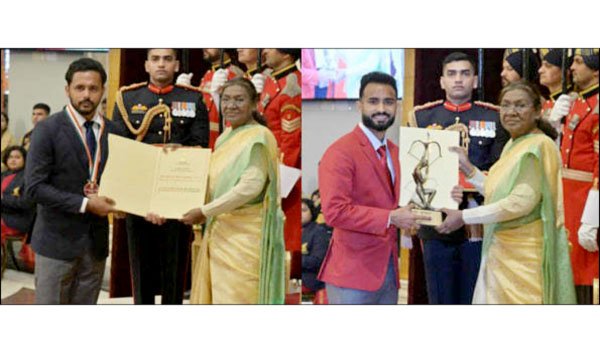New Delhi, Jan 17 (UNI) Defence Minister Rajnath Singh on Friday underlined the need to strengthen India’s offensive and defensive responses in view of the turmoil being witnessed in the rules-based international order.
Addressing an event, to commemorate the ‘Year of Naval Civilians, here, he highlighted the increasing complexities for the Armed Forces due to the tense geopolitical security scenario and pitched to increase the critical capability of the country at the earliest, a Defence Ministry statement said.
“If we assess the entire decade from a defence and security perspective, we can say that it has been a volatile decade. We are witnessing conflicts and wars in different regions across the world. Keeping these things in mind, we need planning, resourcing and budgeting for our security. There is a need to adopt a consultative approach. We need to take inputs from all the stakeholders on how to face future challenges. Our forces should be equipped and ready according to the changing times,” Rajnath said.
The Defence Minister added that the civilian workforce, an integral part of the Armed Forces will play a crucial role in the planning process.
He also stressed that the military is surging forward with a big mandate and complex structure and the civilian workforce “soldiers without uniforms” play a pivotal role as they work behind-the-scenes to provide significant strength to the troops.
Singh asserted that patriotism, valour and discipline help the soldiers to fulfill their responsibility of protecting the country from threats and challenges and the civilian workforce should imbibe these values to further bolster the security infrastructure.
“In the broader perspective of national service, every responsible civilian is a soldier without uniform and every soldier is a civilian in uniform,” he said.
In view of India’s strategic location and its geopolitical situation in the Indian Ocean Region (IOR), Rajnath reiterated the resolve of the Government to strengthen the Navy, terming it as a necessity in today’s times.
He referred to the recent commissioning of three world-class warships – INS Surat, INS Nilgiri and INS Vaghsheer – built in India by Mazagon Dock Limited, stating that it was a result of concerted efforts of all stakeholders. Singh termed the ships as a symbol of India’s empowerment.
“India’s economic prosperity is linked to maritime security. It is, therefore, necessary to protect our territorial waters, ensure freedom of navigation, and keep sea routes, which are our maritime highways, safe. In recent years, major naval powers have reduced their presence in IOR, while the Indian Navy has increased it. There is a possibility of increase in threats in the Gulf of Aden, Red Sea and the sea areas adjacent to East African countries. In view of this, the Indian Navy is working towards increasing its presence further,” the Defence Minister stressed.
Rajnath described cyber security as an important aspect of maritime security in today’s times, stating that ignoring cyber attacks can prove to be detrimental/fatal. He also laid stress on the need to run a special awareness campaign on cyber security in the Armed Forces.
He voiced the Government’s commitment to recognise the contribution of every individual serving the nation. “No one should be left behind. This is the idea with which we are working under the leadership of the Prime Minister. If we talk specifically about the Indian Navy, we have given equal preference to civilian and uniformed employees,” Singh said.
The Minister listed out the initiatives taken for the welfare of the Naval civilians, including the insurance scheme which ensures financial security to the employees and their families. He assured that the Government will take all possible steps to strengthen the Armed Forces, adding that every Indian stands with them.
Rajnath exhorted the civilian workforce to stay abreast with the latest technological advancements and upgrade their skills to realise the government’s vision of Viksit Bharat by 2047. He exuded confidence that, with joint efforts, the nation will be able to tackle future challenges and become a developed nation.
“Our goal is to work with ‘Whole of the Government’ approach. It should not be linked only to the level of department or organisation. If people work together, then no matter which organisation they are associated with, they will work for the larger goal of the country. Moving beyond the ‘Whole of the Government’ approach, we should work with ‘Whole of the People’ approach. Together, we will not only strengthen India from a strategic point of view, but will also give new dimensions to its holistic development,” he added.
Present on the occasion were Minister of State for Defence Sanjay Seth and Chief of Defence Staff General Anil Chauhan and others.
In his welcome address, Chief of the Naval Staff Admiral Dinesh K Tripathi acknowledged the critical role that the Naval civilians play in supporting various facets of the Indian Navy’s operations including technical assistance, administrative management and logistics support. Their support is essential to the Navy’s combat readiness and operational success, he said.











